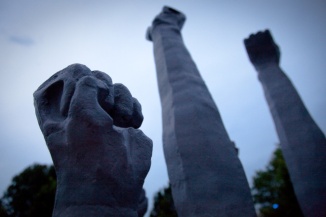 Vuisten (fists) – Power, by Bolwidt on Flickr
Vuisten (fists) – Power, by Bolwidt on Flickr
Power to the People
The public exercise of power is often disliked, mistrusted, or undermined in our society. Roots of this suspicion of power are deep, but this suspicion is often grounded in the exercise of positional power that is not founded upon personal power. It is distasteful to see people occupying positions of power without also embodying the personal credibility to support and enact this power effectively. In contrast to resistance that is often the result of excessive use of positional power, personal power helps to develop followers and their commitment to organizational goals.
Asking the Right Questions
In terms of when and how power can be used most effectively and more acceptably, I would point to the importance of the ethical use of power. On this point Richard Daft identifies key questions leaders need to ask. Some of these questions ask…
View original post 250 more words
